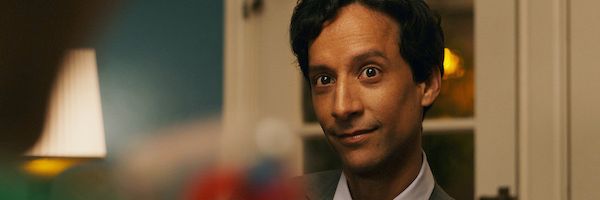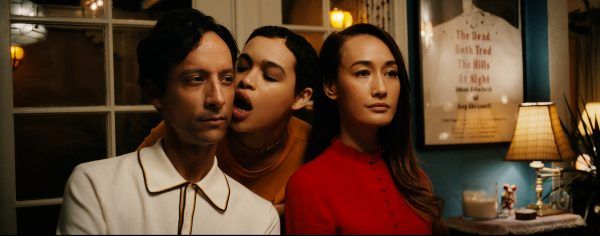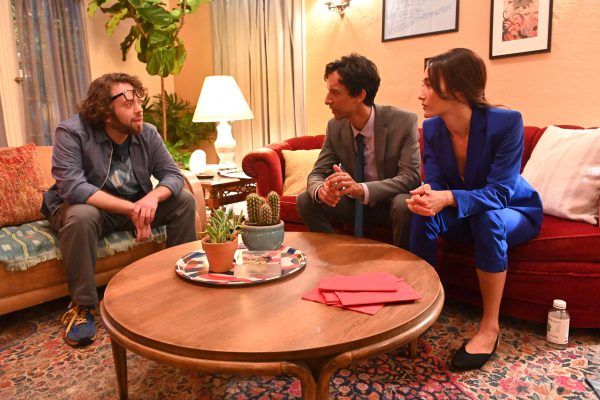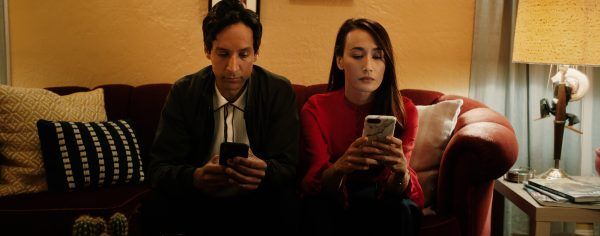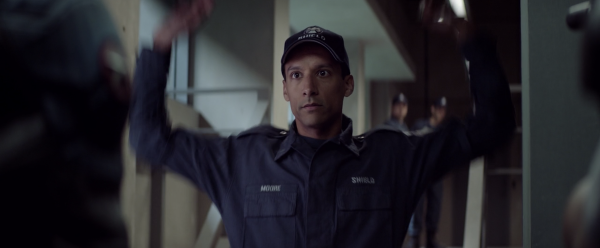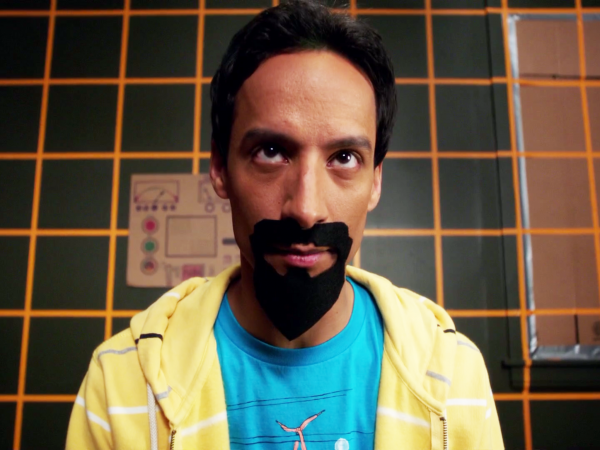It's happened to all of us. We have an argument with someone we care about, based on something fraught that happened in the past. One person swears one version of the truth, the other swears the other. What actually happened? The Argument, a new indie film from director Robert Schwartzman (The Unicorn), aims to answer this question for a couple as literally as possible.
Jack (Dan Fogler) is a struggling screenwriter. Lisa (Emma Bell), his girlfriend, is an actor who just finished a juicy play with charismatic co-star Paul (Tyler James Williams). When subdued feelings of jealousy and inadequacy swim to the surface during a tense dinner party, the two decide to keep having the same dinner party over and over again, until they can find the truth — or at least the best version of it.
One of these dinner party guests is Jack's literary agent Brett, played with gusto by Danny Pudi. I was lucky enough to chat with Pudi one-on-one in a Zoom interview, and we got into the theatricality of The Argument, the joys of having time to rehearse, cultivating a unique relationship with Maggie Q, the joys of voicing Huey in the new DuckTales series, the story behind his surprise MCU cameo, and the future of Community.
Collider: What initially attracted you to The Argument?
DANNY PUDI: So my agent sent me the script, I read it, and immediately I was attracted to the theatrical nature of it. It read like a play to me, and I love that. I love doing theater. I started out doing theater in Chicago, and it felt like something that I haven't done before in film. So that was the first spark where I was like, "This is really exciting." It felt like a chance to combine theater and film, right? So that was really exciting. The character was really fun. I thought Brett was this sort of uber-optimist who has this deep secret where he's just very sad. He wants to be ziplining in Costa Rica or being a dad, and instead he's stuck in this rut with his wife. So I thought that was really fun. But it's like a bottle episode. It was very much like a theatrical bottle episode, one location, very reliant on the ensemble to work. So that to me was really exciting.
I love an ensemble comedy, I always have. And one of the first things I did when I talked to Robert was ask him, "Tonally, what are we going for here?" Because it felt super theatrical, like Noises Off, but I knew this was an indie film, so I was wondering how we were going to stylistically do this, especially in one location. He recommended watching Clue, which I did, and ughh, do I love Clue. And it was kind of this amazing time because right around that time as well, I ended up doing a workshop of Clue, the stage play, that my friend Sandy Rustin is writing. So I was like, "Oh, this is meant to be." So it has this wonderful playfulness, but the ensemble is all there. And I think it starts in one room where you think one person has a secret. Ultimately all these people have secrets, and everyone has to coexist in this room and be very present. So, I guess long story, short answer is, it's very theatrical. It relies on this ensemble to come together and pull off this weird tone piece that feels like a stage play. So I was just very excited about that. I'd never done anything like it. So that was the spark.
I do simply have to know who you're playing in the Clue workshop you're doing.
PUDI: Well, I did it last year, I don't know what's happening with it now, but I did Professor Plum.
Of course.
PUDI: Ughh, what a great character. What a great character. And it's so funny too right now because my kids and I, now we're playing Harry Potter Clue. But there's such fun in this sort of mystery of figuring out, "Who's holding the secret," right? And then ultimately realizing, well, we all got secrets.
I definitely felt like I was watching a play in the best way when I was watching the film. And I'm curious if you all, with Robert, rehearsed it like a play.
PUDI: We did. So that was also super exciting. So when I met with Robert to talk to him about this project, he said that we are going to actually rehearse. Which, for independent film, really any project, even television, we rarely have time to rehearse. You maybe have a table-read, show up maybe a day before or two, and then you're off and running. So this was really exciting because we had about a week of rehearsals where we really had a chance for all of us to come together, explore parts of the characters, see how we bounce off each other, and it was wonderful just to have that time. That was very much a luxury. So we had one week where we came together, in the actual location too, which was super helpful, and we just talked about different things that our characters might do.
I have this one moment where I went up to Robert, before I really knew him, and I said, "I think at this moment, I need something like... can I hold celery here? And I just need something in my hands because it feels like..." And we were very limited. We were in one location, most of the time in the dining room sitting on a couch. So we had to be really creative about how we use that space. And Rob was like, "Yeah, you should take two pieces of celery, more." And he would bring over a celery plate. And I didn't know if he was messing with me, but he was 100% down creatively to be like, "Let's see how we can maximize this space, use the environment."
And that's really what that week was all about — "let's look around." It's a very tight space. Also with the DP [Michael Rizzi] who is amazing about trying to navigate the space with all of us, trying to figure out how we can all fly around, be ourselves. And in the film, the first part of the movie, we really had to figure out what we wanted to do because that would establish everything else moving forward night after night after night. And so we had to make sure we were consistent and specific about how we want to establish our characters because from there, we all unravel, and we had to recreate all these things. So we shot it sequentially. But that first week was especially all about establishing that first night, so we knew who our characters were and [had] a chance to really play off each other, explore the space. Like I said, the environment was really crucial and that was also a character in the movie. So we had a chance to play, and I think Robert created an environment where we were all allowed to really explore who we were, like the cast of Clue. Everyone had their own thing that they were bringing into the table. And that was that week. In independent film, I had never had that experience where we had that much time to play together before we actually showed up and started filming.
You spoke to the central hook of the film, which is such a fun discovery to make around 20 or 30 minutes into it when it kind of becomes a weird, forced time loop. And I'm wondering as an actor, what are some of the challenges and what are some of the fun moments of having to have the same thing be the stimulus to react to over and over again?
PUDI: It's exciting. I remember an acting exercise I actually did in college, and that was one of the first things that I thought of [when working on the movie], where my theater instructor, who was pivotal in my experience, she made me drink a cup of tea every day for a week straight and write down my notes on drinking a cup of tea every day. And it felt a little bit like that, where you were trying to find something new every day, but really paying attention to how you drink your tea, how you hold your tea. And that's kind of what happens in this night, because we're forced to replicate what we did the night before, but we have to do it, sort of act natural, but it becomes very much about being present, thinking about what you were doing, all your actions, realizing that maybe some of your actions had unintended consequences, especially with me and my character and Sarah, played by Maggie Q, who's incredible. Our relationship, really we start to uncover how we communicate with each other and the way that we talk to each other. And when you have to really think about how you said something or what you said, it makes you really consider again, "Maybe I shouldn't have said that the first time." [laughter] So it was thoughtful. I think a part of the whole rehearsal process is [that] we wanted to make sure that there were elements or obstacles that we had built in, like I was holding this bottle of alcohol in the corner during this moment. So that way there were places where we could go and have very specific moments that we had to remember, actions. So that way it didn't also feel like we were just sitting and talking on the couches. So in this moment I might be standing in the corner, pouring a glass for someone. In this moment I would be crossing. So it was actually really exciting.
I imagine continuity must have been kind of a nightmare.
PUDI: Yeah, which we were super worried about going into it, because we were like, "How are we going to do this?" But we had an awesome team marking down all our traffic patterns. Robert and the script supervisor, everyone, they were just like, "Don't worry. Just go, we'll get it. We'll figure it out." And they did. So I think it all came together, but that was definitely something we were always thinking about like, "How do we find moments of spontaneity?" Especially after the first night, there's just a lot of reacting to what we previously did.
Shifting gears for just a second, you are the voice of Huey on the new DuckTales reboot, which is so fun. What is something surprising you have found about joining the Disney family, being part of the Disney fold?
PUDI: There are many things. I think it's super joyful. It's a super joyful job where I literally just go into a booth and scream and they just will give me notes like, "Scream louder, scream higher, act more scared." So it's very cathartic, there's like a therapeutic nature to it where you can just go into a booth and scream and have fun, right? So that's really fun. In terms of surprising, they've been really kind, because I have kids, to give us a couple of treats. I was able to bring them into a voiceover booth and they met the voice of Goofy. So that was really just kind of fun where you're like, "I wouldn't have been able to ever do that." The kid in me, I grew up watching Disney afternoons with my brother and sister, so it's sort of this fan in me gets to do a job that I've always loved doing. So it's my first actual voice over acting job as a cartoon, and it's been just very joyful, I would say.
We're in the middle of airing Season 3 right now; are there any particularly juicy or fun Huey moments coming up that you're excited about?
PUDI: Yeah. I think this whole season. I think last year was one of my favorite things ever, where Huey has this dream and he ends up just having very long legs. His dream is just to be super tall. And he's not great at imagination, I think we've come to learn. Huey is an excellent planner, he's reliant upon his JWG, Junior Woodchuck Guidebook, and without it he thinks he's nothing. So I think in season three, especially, you see him exposed. Without the book, what is he going to do? How does he live with uncertainty? (laughter) So I think you get to see a lot. I think [creators] Frank [Francisco Angones] and Matt [Youngberg] have done a really great job of playing with Huey's neuroses, and I think you see a lot of that come up in season three, which is really fun. We level up in terms of screaming and Huey really trying to come to terms with what it's like to live in sort of an improv world. Dewey definitely has that down, but Hubert is still learning how to live [spontaneously]. So it's really fun. And then this is the first season where we have the full family together on adventures. So there's a lot of that, too. It becomes very much about like, okay, it's Thanksgiving for a season. Let's live together and see what happens.
Speaking of Disney, one of my very favorite moments watching Marvel movies was seeing Captain America: The Winter Soldier and seeing you pop up. Can you walk me through the process of getting cast and coming to shoot a Marvel Cinematic Universe movie?
PUDI: Absolutely. I can only speak for myself when I say this, but I got a text from Joe Russo, who was a director of Community at the time, and said, "What are you doing on July 4th?" I said, "I think I’m with my family. We might go to this parade." And he said, "Do you have some time in the afternoon?" I said, "Yeah, well, in the morning we’ll go for this parade and we’re having some hamburgers, but afterwards I’ll stop by." He was filming in Manhattan Beach. So I show up at Manhattan Beach, there are no sides, no script. I don’t know what I’m doing. He said, "We’d like you just to pop into this scene with Captain America." And I said, "Great." And then they gave me a sheet of paper, on set, with a couple of lines, and then they made me give them the sheet of paper back. And then Captain America, in one take, punched me, and I was super excited because I thought this was going to be in the movie and I was like, "This is amazing." I want to take a punch and then I want to be able to stand right back up, you know? Just to be like, "Okay, I took a punch. It was hard, but I could get back up after being punched in the face by Captain America." None of that made it into the film. [laughter]
Months later, I saw the film. I’m in it. All my friends were like, "How did that happen?" I wasn’t allowed to tell anybody I was in it, and it was a surprise, and that’s pretty much how it came to be. And people are now wondering, did I make it? Am I still around [post-Thanos snap]? I believe I am. I believe I’m S.H.I.E.L.D. I believe I’m a good guy. I believe I have heart. Without me, I think that film doesn’t work. I’m gonna say that. [laughter] So that's my journey in the Marvel Cinematic Universe.
Do you think we'll see that character pop up again?
PUDI: It’s possible. I mean, to be honest I have no idea. [laughter] I truly have no idea. Based on my experience, I didn’t have any idea what I was doing the first time I was there, so anything is possible.
Speaking of anything is possible, I'm a huge Community fan. It was such a joy for me watching you revisit that character in that Zoom table-read. What did it feel like putting Abed back on? Did he come naturally to you? Was there a bit of learning curve? What was that like?
PUDI: I guess it comes pretty natural because we were also reading a script from the actual episode. So it wasn't a new episode, right? So it was something we've already done, which was so fun. And the episode is all, again, the theme, I guess, secrets, it was all about the lie detectors and all these things. So the characters were, I think, boiled down to their essential nature in that episode. And we were all sitting down, I think, which was helpful. In terms of developing that character and working with Dan Harmon, physicality was important to me and being around the table and seeing how everybody reacted, that was very important to me. But I look at TV now and I am very grateful. We had 110 episodes of Community. So there is a lot of time to really dive into the world, all the worlds of Abed. So at first it might feel a little rusty, but it also felt very natural. And we haven't been together and we haven't done anything like that since we've left the stages of Community. So it was also really exciting. It felt new again, it really did. And also having Pedro Pascal in there felt extra new [laughter] because watching him discover what we were talking about in the moment was thrilling.
That moment where he couldn't get past the word sperm was just...
PUDI: Ahhh. Well. I mean, if you had to describe that in the show, each character is getting a can of sperm to someone, people would be like, "That's not a real show. You can't have a show where the third act revolves around cans of sperm going around the table. A show can't exist where that is a major..." And so I get the reaction, but that's what made it really, really fun. So that gave that Zoom table-read an extra level of enjoyment for me, where I could play Abed, but I could also be watching everyone else discover this for the first time.
It is my due diligence to ask, is there any potential future return to Community? Has anyone been talking about it?
PUDI: We have talked about it multiple times. I think it's definitely something that keeps coming up. I think we have tremendous fans and I believe there's an appetite for it. And I think all of us have all said — I don't want to speak for everyone, but I'm definitely down. I think that Zoom table-read was the first time where maybe we're like, "Oh, we could actually do this. This will be kind of fun, right?" A couple of people have asked me, "How would we do this?" And even during the show, I never predicted arcs for Abed. I never wanted to... I prefer being surprised as an actor, and Dan Harmon and the writers did such an amazing job of continuing to dive deeper into the worlds, and I wouldn't have been able to predict the Dreamatorium, for instance, or alternate timelines. So that's the fun of the show. Where does it go from here? What is the movie about? Is it based on the lie detector episode, do we go and find all the devices that Abed has planted on the characters and bring everybody back together? So there's a lot of ways for us to go, but I think that Zoom table-read, and we still all communicate with each other, I think it would be really fun. And I think enough time has gone by too now where there's just more appreciation for what we had and for the family that we all became on set. I don't know what the answer is, but I'm excited if it does happen.
There's such a funny detail that keeps coming up in The Argument. Dan Fogler's character wrote this self-aware zombie movie called The Dead Doth Trod the Hills at Night. And I'm curious, what would Abed Nadir think of that film?
PUDI: Wow. Well, I think two things would happen. I think Abed would definitely not enjoy it as much as Brett would. Brett enjoyed it because it was his first sale and Doth Trod, as he would call it, was a big deal in his career as a literary agent. It was actually his only sale, I believe, as a literary agent, so that mattered to him. But during the creative process, we learn that Dan and the director didn't agree on certain elements, bazookas and different elements coming together regarding humanity and zombies coexisting. So I think Abed would appreciate Dan's original vision, and I think that Abed would want to watch the Apocalypse Now version and would definitely want the director's cut — or no, he wouldn't want the director's cut, he'd want the writer's vision, too. I think he would dive deeper into this. Like Kickpuncher though, he would definitely be watching it over and over again. (laughter) And possibly be doing fanfiction on it. So I think Abed would actually really enjoy it, but I think he'd be probably trying to pick it apart more.
The Argument hits virtual theaters and VOD September 4.

